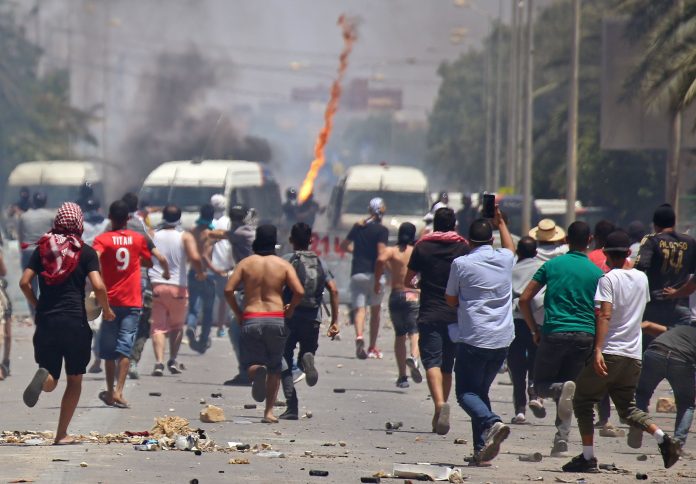Tensions between the protesters and the police are rising in Tataouine in southern Tunisia. An area that has been ravaged by social unrest for the past month amid unemployment and marginalization in the region.
Clashes resumed Monday morning with police firing intense tear gas to disperse hundreds of young demonstrators in the city center.
The day before, violent protests have already taken place between the protesters and the police. Demonstrators are seeking jobs and the release of Tarek Haddad, a leading figure in the movement. He was calling for the implementation of agreements signed in 2017 to enhance the distribution of wealth.
This activist is “wanted by justice,” according to the governor of Tataouine, Adel Ouergui, who has not provided further information. Upon his capture, “sympathizers” closed the public highway and attempted to attack a security forces building with Molotov cocktails. Ten people were arrested, the Ministry of the Interior said in a statement issued on Sunday.
Following skirmishes that lasted the night, the army was deployed in support of state institutions on Monday, Defense Ministry spokesperson Mohamed Zekri said.
Denouncing the “excessive and unjustified” use of force against the demonstrators, the trade union center UGTT called for a general strike in Tataouine on Monday. Businesses were open, but public services and state institutions remained closed in response to the call.
The protesters are pushing for the implementation of an agreement concluded after months of sit-ins and clashes in 2017. They ai to hire thousands of unemployed people in the hydrocarbon production firms of the Tataouine region.
Confronted with promises “not fulfilled” by the state, protests in this neglected region have revived in recent weeks.
Protesters constructed tents and blocked the road to trucks belonging to oil and gas companies based at the El Kamour area, 160 kilometers away, in the middle of the desert.
The 2017 deal, negotiated by the UGTT, also called for the State to spend 80 million dinars (approximately EUR 27 million) annually in the Tataouine region, but this did not occur.
These disruptions come at a period when Tunisia, relatively spared by the Covid-19 pandemic, is experiencing significant political issues within the coalition government and the social effects of health limitations that have intensified inequality.
Reference: https://fr.africanews.com/2020/06/22/tunisie-violents-heurts-dans-le-sud/

